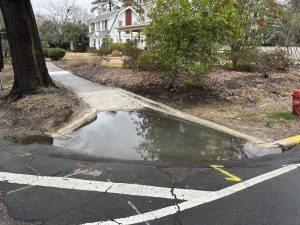At the Barktoberfest Halloween celebration at Durham Central Park, City Council member Charlie Reece scored a fun assignment. He helped judge the dog-costume contest.
Family fun in the heart of downtown is so Durham. But so are lots of extremely serious and complex problems, from a recent spike in shootings to a shrinking supply of affordable housing during a building boom.
Seeking re-election to a second term, Reece said he wants to remain a part of it all, especially addressing the city’s toughest challenges. That will involve building on recent successes, he said.
“We’ve made real investments in the police department and infrastructure and we’re now paying all city workers a living wage,” Reece said. “But the fact that we’ve made a lot of progress doesn’t mean that things aren’t broken. They are broken, but they’re somewhat less broken than when we got here.”
As a 10th generation North Carolinian and UNC Law School graduate, Reece has planted his roots close to home. A former prosecutor trainer on domestic violence and sexual assault cases, assistant attorney general and general counsel for the family clinical-research company Rho, he’s lived in Durham for 12 years.
Reece got involved in Durham politics as the Democratic precinct chair for precinct 39 in affluent Hope Valley and southwest Durham. From there he served on the state executive committee and later as state treasurer for the state Democratic party.
When secretary of the board of the influential Durham People’s Alliance political action committee, he became the spokesperson for key policy issues including racial disparities in policing in Durham. In 2015, after two at-large incumbents on city council did not seek re-election, Reece ran and won.
Four years later, Reece wants to keep what he said is the best job he’s ever had. His campaign touts a platform shared with fellow incumbents Jillian Johnson and Javiera Caballero that focuses on public safety, expanding access to housing with the proposed $95 million affordable housing bond, and bolstering the economy to bring more jobs.
The council vote in March to deny Chief C.J. Davis’ request for funding for more officers angered some debating over how to make Durham more safe. This issue split the council too, as a 4-3 vote ultimately tilted the scales. All incumbents on the ballot this week voted against adding more officers.
Reece said he came to his decision carefully. “Public safety has always been a priority for me,” he said. “Over the last four years since I’ve been on the council, the council has made an unprecedented series of investments in public safety, specifically in the police department.”

The current city budget increased police funding, and 36 new officers have been added to the force over the course of Reece’s first four-year term, he said. Given this and the overall improvements in both the police department and public safety that Reece sees, he firmly stands behind his vote.
Reece and his colleagues have also worked to create financial incentives to motivate officers who train in Durham to stay in Durham, and spent $71 million on a new police headquarters, he said. As a result of these investments, Reece said, Durham has seen a gradual decrease in violent crimes over the past four years.
While violent crime, including fatal drive-by shootings, is up this year, that data is compared to a record-low crime rate in 2018, Reece stressed.
Reece wants to continue to invest in community-rooted safety initiatives. He regularly meets with members of the activist group Durham Beyond Policing to work with them to develop and fund a community wellness plan, he said.
Reece also emphasized the importance of tackling social issues contributing to crime, even during the city’s economic boom. That includes unequal access to jobs with living wages and a declining supply of affordable housing.
Reese supports a $95 million affordable housing bond also on the ballot. The most important thing it would do is provide funds to improve public housing communities in Durham that are crumbling, Reece said. The bond is also expected to help provide 1,600 new affordable housing units.
“The bond isn’t going to solve the entire problem,” he said, “but without it, the Durham that we love, the Durham of grit and drive and determination, a multiracial, multi-class city, is going to slowly disappear.”
Improving the overall state of Durham’s economy will lead to improvements in both affordable housing access and public safety, Reece said. The approach Reece supports is not the most traditional.
Reece supports a strategy put forth by the Durham Economic and Workforce Development department called Built2Last, labeled A Road Map for Inclusive and Equitable Development in Durham. Developed by the Kenan Institute of Private Enterprise at UNC Kenan-Flagler Business School, this plan has proposed four key strategies, including a sustainability scorecard for businesses and a fund for equitable community economic development, that aim to include everyone in Durham in its economic growth.
Reece said that Built2Last works to shift the focus of economic development away from the more traditional cash-for-jobs approach of offering tax cuts or other incentives to draw or keep businesses in Durham.
“We can instead focus our efforts internally, into the city, and imagine a world in which the city’s robust economic development budget is invested into our homegrown entrepreneurs and businesses that are owned and operated by people that live here in the city of Durham,” he said.
Challengers have criticized Reece, Johnson and Caballero for running on a shared platform, Bull City Together. Unlike what critics have said, the shared platform is not a power play or group think, Reece said. Instead, crafting the platform helped the three incumbents develop a robust policy plan that aims to help efficiently solve problems, he said.
“There’s only three of us, and we don’t always agree,” Reece said.
Reece admits he is frustrated with some of the criticism he and other incumbents are attracting as Election Day nears.
“There’s a narrative that’s been pushed in this campaign that the incumbents just don’t listen to certain types of folks,” he said. “But we listen to everyone that we hear from. The problem is that on any decision that we make, whether it’s how much to spend on sidewalks, where to put a new public park or how many police officers to hire, we have to make a decision.”
No city council can ever make everyone happy, he said.
“We make the decisions that are consistent with our own values and with what we think is right,” Reece said, “Every four years, the people of Durham get to tell us whether we have made enough right decisions.”
At top: Charlie Reece holding campaign materials describing the Bull City Together platform he worked up with incumbent City Council members Jillian Johnson and Javiera Caballero. Photo by Cameron Beach
Caroline Petrow-Cohen






Comments are closed.